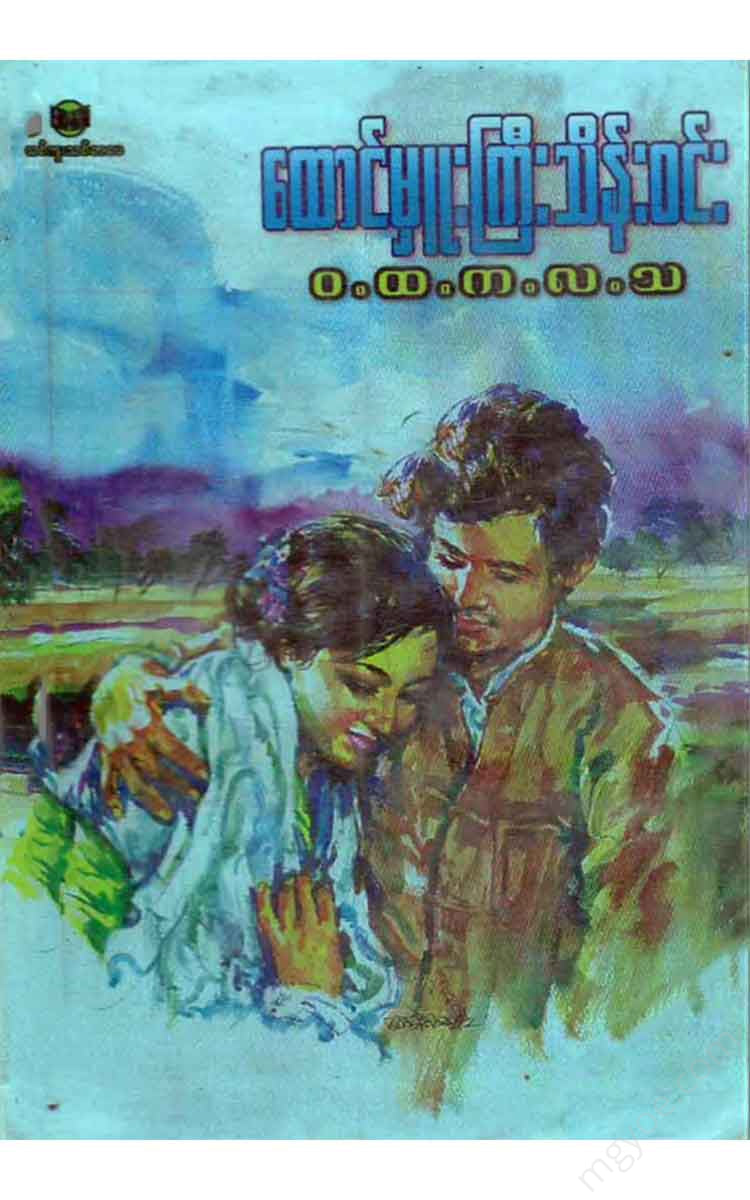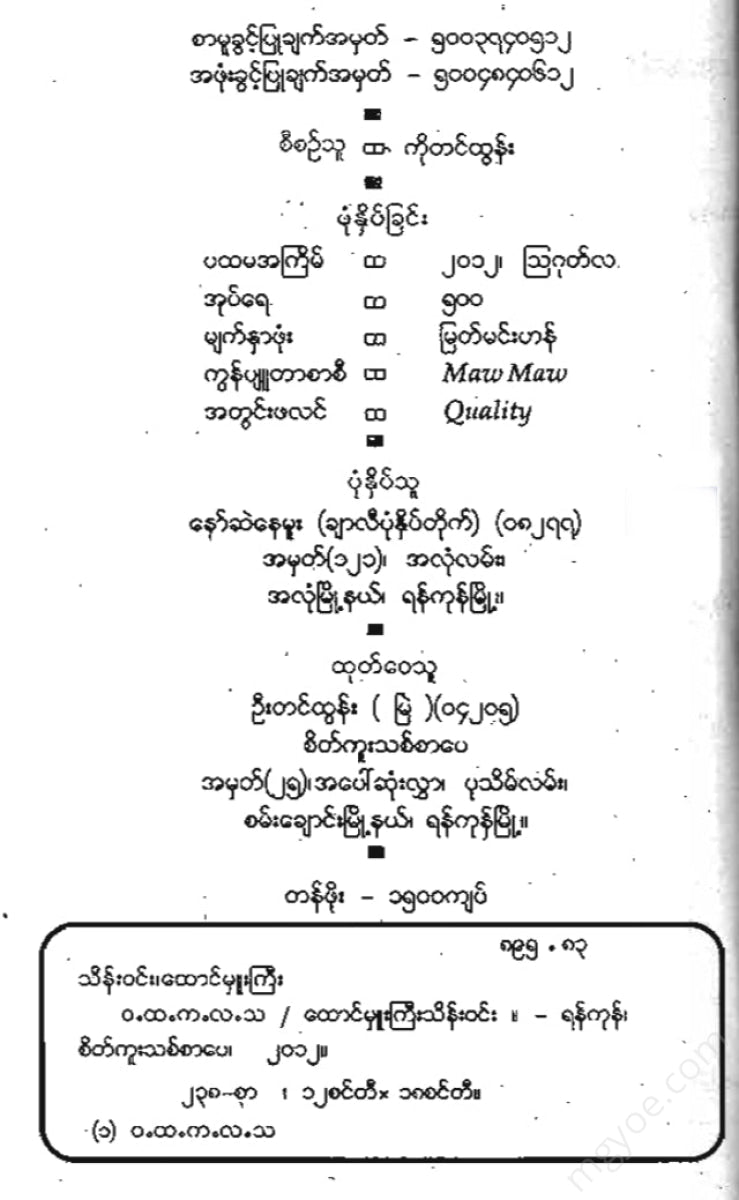Other Websites
Prisoner Thein Win - 1911
Prisoner Thein Win - 1911
Couldn't load pickup availability
Chapter (1)
In early March 1970, we university students registered with the University Student Affairs Department to provide three-letter (a) courses for children in rural areas in the upper reaches of the Yangon region, and as arranged by the Central Committee of the University, we set off by special train from Yangon Station.
With the summer holidays over for the second year of school and a lot of freedom, instead of wasting time at home, they set out on a journey with the aim of gaining local knowledge, imparting knowledge, and making new friends.
My friend is Ko Tin Shwe, a first-year geography major. He is from Mawlamyine (Kyokhami), and has never been to Upper Myanmar, so I organized and invited him.
Most university students return to their parents' hometowns and towns during the long summer vacations and help their parents with their small businesses. Most of the people who come to work outside the country are the children of city workers like us.
The train left Yangon Station at around 8:00 a.m., and the Central Committee of the Union of Myanmar, teachers, and students greeted the train, making Yangon Station very crowded.
It was so much fun to greet each other as the train left . There were over 500 students and teachers on the special train, along with their supervisors. They said goodbye to the stuffy city of Yangon and left.
At lunchtime, when we arrived at Nyaung Lay Pin, the people who were supervising us distributed the lunch packets and we sat on the train.
We ate happily. The female students had a lot of rice, so we had a variety of dishes.
Even though they had never met before on the university campus, they became close friends just by meeting and seeing each other. This was a blessing in disguise. At night, they sang songs together. They were not shy about each other anymore, they were like real siblings.
When we arrived at Mandalay Station, we were served dinner. Teachers and students from Mandalay universities also came to greet us, which was a joy. We had to wait for a long time because the train was changing trains at Mandalay Station. Students also went shopping.
At around 9pm, the train left Mandalay Station. We had to sleep all night, so as the night progressed, the sounds of the old man and the old woman became quieter. We were tired from the journey and our stomachs were full, so we went to sleep. We arrived in Monywa at dawn.
Our group was temporarily accommodated in a high school near the station and welcomed by the locals. They served us an early breakfast of coffee, tea, sticky rice, and various fried foods.
Then, we were divided into different universities by year and assigned to different townships in Monywa. At around 9 am, the townships came to pick us up in large pickup trucks.
Our assigned area is Butalin Township. In the morning, the air is gradually warming up. Along the road, there are thorn bushes, thistles, palm trees, and rain-spiked bushes. Only plum trees and tangerines occupy the place. The green forest below, like the village below, is rare -
It is a dry and arid region, so the yellowness is very restrained. As the sun rises, the hot wind blows and it becomes hot. Dust is left on the side of the road. The oxen pulling the cart are also thin.
We are a group of about 50 students assigned to Butalin Township. It was about 12 noon when we arrived at Butalin Township, the township. Even in the hot sun, the residents welcomed us with drums and drums.
We were placed in a large urban village high school, separated by gender. Lunch was also prepared, with chicken and pumpkin soup, as well as various types of beans and rice. The variety of dishes prepared by the villagers was very appetizing for us.
The fried vegetables of Angye, fenugreek leaves, fenugreek leaves, tamarind leaves, and chili paste make a very delicious meal. That day, we did not have time to distribute our group to each village, so we stayed overnight in the high school in the town. On the other side of the town, there is a small village called Zitaw, and from there, you can walk about (3) miles to the very mysterious Dwintaung. “It is very hot in Angye even at night. Even at (9) o’clock at night, we still can’t sleep. Some people play guitar, others talk together, and rest. The lanterns are lit all night.
The next morning, breakfast was served at the village school in the town. There was coffee and sticky rice, as well as various fried foods. At that time, carts of food arrived from various villages. The township utility committee allocated women to the town and nearby villages, so they left in carts before the sun rose. The men were divided randomly by drawing lots.
Ko Tin Shwe and I did not draw lots. We were given a list to go to the most remote villages where others did not want to go. Therefore, all morning, the carts that were carrying the students were coming and going. Finally, at 11 o'clock in the afternoon, the carts that were carrying the two of us had not arrived.
At that time, a senior executive...
“The Tugyi and Mong Htoo villages where we are assigned are located on the outskirts of Butalin Township. It is about (10) miles away from the township. Now... let's have lunch and wait quietly.”
After we had lunch, we were preparing our things to be ready for the cart to arrive. At about 12 noon, a cart arrived, full of dust. The cart driver and an old man were also there. The executive officer said... '
“Are U San Shwe and Ko Aye Thein too late?”
“Yes, sir... They have been out since (6) in the morning... U Bo Thin Rae is on the mountain road. The cows are thin this season, so they are driving slowly. Now, they must have rested for (1) hour, the cows are very tired.”
"Rest, rest. Give the cows a rest, feed them, and water them. The elders should also rest while they eat lunch. They will stop searching on the road. Their village is very remote."
"Oh my... that's why we are so angry with our village teachers."
At that time, "I said, 'Okay, sir. We also deliberately chose the most remote and remote villages where teachers don't want to go. That way, we will be more meritorious."
“Yes, teachers. Our village is very dry, and there is not enough food or water. This season, the cows are fed only palm milk and palm peels, so the cows are very thin. But teachers, don’t worry, our villagers are very kind.
"We will provide a water cart for bathing. For food, we have various beans and chickens raised in the village. Finally, even if the food in the village is not good, we will cook it for you every day."
"Yes... Sir, we are not here to eat luxuriously, but to study the nature of the countryside and to give alms. We can be content with what we eat."
“Ayebya • • I like that spirit of our teachers. We think it’s difficult for women and teachers.”
"We also ask, 'Where will we send our teachers to villages that are so stubborn like the elders?'"
A committee member came in and said, '
So the committee fed the elders lunch and the cows were fed and watered.



